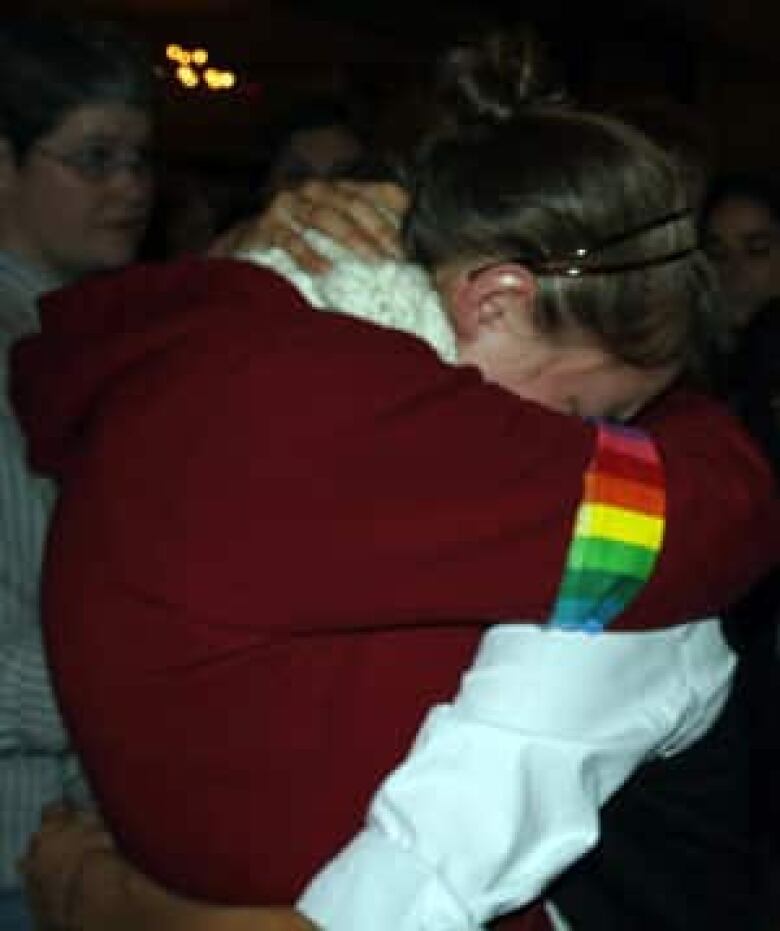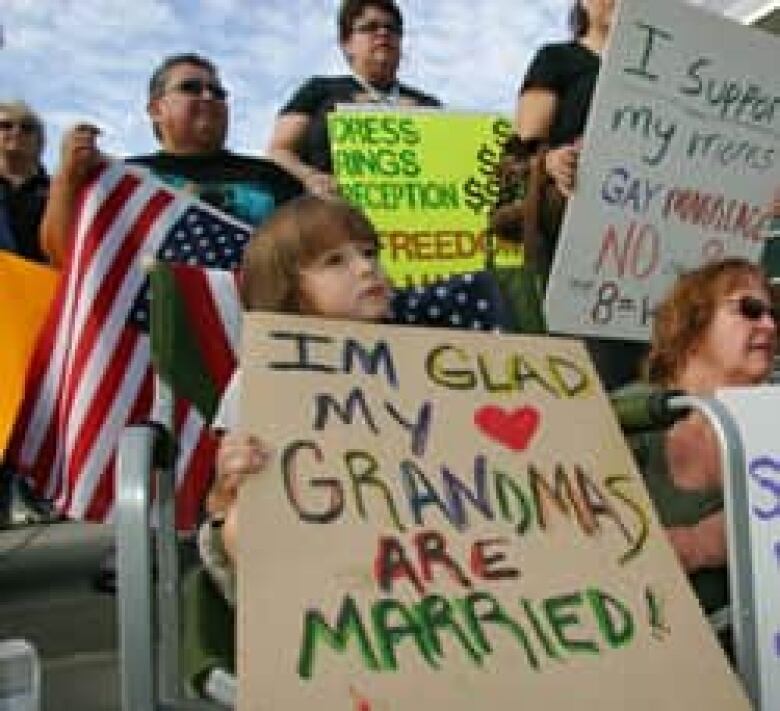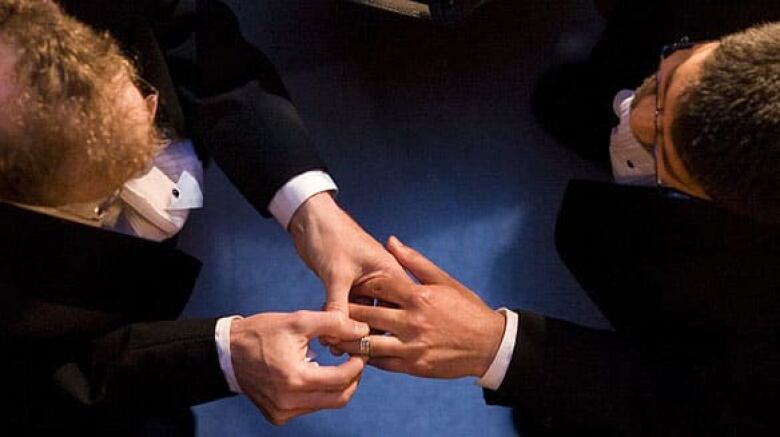Same-sex marriage around the world
From criminal prosecutions to legal unions
Before theCriminal Law Amendment Act was passed in 1969, homosexuality was acriminal offence in Canada, as itremains to this day in many other countries.
Four decades later,Canada andnine other countriesArgentina,Belgium,Iceland,The Netherlands,Norway,Portugal,Spain,South AfricaandSweden have granted marriage rights to same-sex couples on an equal footing with heterosexuals.
Yet many other countries, as well as most American states, havelaws restricting access to same-sex marriage.
Here are some key dates in the story:
May 8, 2012: North Carolina, U.S.
Voters in the state approve a constitutional amendmentdefining marriage solely as a union between a man and a woman.
March 1, 2012: Maryland, U.S.
Gov. Martin O'Malley signs into law a bill that would legalize same-sex marriage. The law won't take effect until January 2013 though, and risks repeal if opponents gather enough signatures to force a referendum in November.
Feb. 17, 2012: New Jersey, U.S.
Gov. Chris Christievetoes a bill allowing same-sex marriage in New Jersey. His decision came a day after the state Assembly passed the bill. Christie, a Republican who opposes same-sex marriage, had vowed "very swift action" once the bill reached his desk.
Feb. 13, 2012: Washington, U.S.
Washington state Governor Chris Gregoire signs a gay marriage measure into law, effective in June. However, if opponents gather enough signatures to force a referendum, it might not take effect until November at the earliest.
Feb. 7, 2012: California, U.S.
The 9th U.S. Circuit Court of Appeals rulesthat Proposition 8, a 2008 provision that banned gay marriage in California, is unconstitutional. This likely means that Proposition 8, which was approved by voters, will likely move to the U.S. Supreme Court.
Jan. 12, 2012: Canada
The federalgovernment says it isconsidering how to make divorce possiblefor same-sex couples who had to come to Canada to get married. Thousands of gays and lesbians who could not marry in the country where they live have travelled to Canada seeking a legal marriage. But Canada's divorce laws don't allow people who haven't lived in Canada for at least a year to end their marriage.
Jan. 1, 2012: Delaware and Hawaii, U.S.
These two American states begin recognizing civil unions between same-sex partners.
July24, 2011: New York state, U.S.
Same-sex weddings are legally recognized one month after New York lawmakersnarrowly voteto legalize same-sex marriage. New York becomesthe sixth U.S. state where gay couples can wed.
Aug. 4, 2010: California, U.S.
A U.S. Federal Court judgeoverturns Proposition 8, California's controversial same-sex marriage ban.
July 15, 2010: Argentina
Argentina's Senatevoted in favourof a same-sex marriage bill, making it the first country in Latin America to grant same-sex marriages all the rights of heterosexual unions.
American divide
The followingstates, as well asWashington, D.C.,currently allowsame-sex couples to marry:
- Connecticut
- Iowa
- Massachusetts
- New Hampshire
- Vermont
- New York.
July 7, 2010: Hawaii, U.S.
Hawaii's governorvetoes legislationthat would have allowed same-sex civil unions. Gov. Linda Lingle told a news conference the bill would have allowed "same-sex marriage by another name."
June 27, 2010: Iceland
A law allowing same-sex marriage comes into force in Iceland. That same day, IcelandicPrime Minister Johanna Sigurdardottirweds her longtime partner, Jonina Leosdottir.
June 5, 2010: Portugal
Same-sex marriage becomes legal in Portugal, almost three weeks after the country's conservative president signed a gay-marriage bill into law. President Anibal Cavaco Silva said he did not veto the bill because the majority liberal lawmakers would only overturn his decision.
March 4, 2010: Mexico City, Mexico
A law allowing same-sex marriages in the city comes into effect.
Dec. 2, 2009:New York state, U.S.
The New York state senate rejects a same-sex marriage bill that the main assembly had passed six months earlier.
Nov. 4, 2009: Maine, U.S.
Maine voters repeal a state lawthat would have allowed same-sex couples to wed. State lawmakers had voted in favour of same-sex marriagethe previousMay.
June 3, 2009: New Hampshire, U.S.
New Hampshirebecomes the sixth state to legalizesame-sex marriage after the state house and senate pass legislation. The governor signs the bill into law the same day.
May 18, 2009: Washington state, U.S.
Washington Gov. Chris Gregoire signs into law a bill that extends all the domestic rights and benefits of heterosexual marriages to same-sex couples. The "everything but marriage" law would be upheld in a referendum in November.
May 9, 2009: Hungary
Hungary's official government publicationannounces thatgay couples will be able to register domestic partnerships beginning July 1, provided both partners are at least 18 years old.

April 7, 2009: Vermont, U.S.
Vermont becomes the fourth state to recognize gay marriage. At the same time, Washington D.C. also moves to recognize same-sex unions performed in other states.
April 3, 2009:Iowa,U.S.
Iowa becomes the third state toallow same-sex marriages after the state'sSupreme Court unanimously upholds a lower court's decision to strike down a 1998 state law defining marriage as a union between a man and a woman.
Several couples rushed to tie the knot on April 27, the day the ruling took effect.
April 1, 2009: Sweden
Sweden'sparliament votes226-22 to recognize same-sex marriage.
Sweden gave gay couples legal "partnership" rights in the mid-1990s, and allowed them to adopt children from 2002. The new law, which comes into force May 1,lets homosexuals wed in either a civil or religious ceremony, though individual churches can opt out.
Jan. 1, 2009: Norway
A law comes into effect allowing gay couples the right to marry, adopt and undergo artificial insemination.
Nov. 4, 2008:Various U.S. states
A 52 per cent majority of California voters support Proposition 8, a ballot initiative thatdefinesmarriage in the state constitution as a union between a man and a woman. Thevotereversed a May 2007 California Supreme Court decision to strike down the state's ban on same-sex marriage.
Six months after the vote, the California Supreme Court upheld the Proposition 8 ban. But it also ruled thatthe roughly 18,000 existing same-sex marriages carried out in the state before it came into effect can stand.
Amendments to ban gay marriage arealso approved in Arizona and Florida. Arkansas voters approve a measure banning unmarried couples from serving as adoptive or foster parents. Supporters of the Arkansas measure make itclear that gays and lesbians are their main target.
Oct. 10, 2008:Connecticut, U.S.
Connecticut legalizes same-sex marriage. The move came after eight same-sex couples sued the state, which had only allowed them to be joined through civil unions. The stateSupreme Court ruled 4-3 in their favour.
June 11, 2008: Norway
Norway's parliament passes a law allowing gay couples to marry and adopt children, by a vote of 84 to 41. The legislation replaces a 1993 "partnership" act that allowed same-sex civil unions.
Feb. 9, 2007: Italy
The Italian cabinet approves legislation to grant legal rights to unmarried couples both same-sex and heterosexual but stops short of allowing gay marriage.

Nov. 21, 2006: Israel
Israel's High Court of Justice rules that two gay men married in Canada, as well as four other same-sex couples wedded abroad, should have their union recognized in Israel.
Nov. 14, 2006: South Africa
South Africa's parliament passes a bill giving same-sex couples the legal right to marry or to have a civil union, making it the first African country to approve same-sex marriage.
Nov. 7, 2006: The U.S.
Voters in Arizona, Colorado, Idaho, South Carolina, South Dakota, Tennessee, Virginia and Wisconsin are asked whether they support a ban on same-sex marriage. The ballot measure passes in all states except Arizona, where it wouldbe ratifiedtwo years later.
Oct. 25, 2006: New Jersey, U.S.
New Jersey's Supreme Court rules that same-sex couples are entitled to the same civil rights as heterosexual couples. Gay marriage is still not approved in the state.
July 20, 2005: Canada
Same-sex marriageis legalized in Canada, a day after the Senate approved Bill C-38 by a 46-22 vote. Three senators abstained. The legislation was introduced by Liberal prime minister Paul Martin after gay and lesbian couples launched lawsuits in different provinces demanding the right to marry.
By the time the federal bill made its way through the House and Senate, same-sex marriage was already legal in eight provinces and one territory.
June 30, 2005: Spain
The Spanish parliament makes gay marriage and adoption legal. The law also allows people to inherit the property of their same-sex partner.
April 14, 2005: Oregon, U.S.
The Oregon Supreme Court throws out nearly 3,000 marriage licences issued to same-sex couples by Multnomah County. It says laws governing marriage are a state matter and the county didn't have the authority to issue the licences.
Dec. 9, 2004: New Zealand
New Zealand passes the Civil Union Bill to recognize unions between homosexual couples and unmarried heterosexuals, giving them the same rights as married couples in child custody, taxes and welfare.
Nov. 2, 2004: The U.S.
Voters in 11 states Arkansas, Georgia, Kentucky, Michigan, Mississippi, Montana, Oklahoma, Ohio, North Dakota, Oregon and Utah pass amendments to state constitutions banning same-sex marriage.
Aug. 3, 2004: Missouri, U.S.
About 72 per cent of Missouri voters support an amendment to the state constitution banning gay marriage, making Missouri the first state to do so.
July 14, 2004: The U.S.
The U.S. Senate rejects a bid to amend the constitution to ban gay marriage. Before the vote, Republicans said a setback in the Senate would not deter their efforts to get the amendment passed. Six Republicans voted with the Democrats against the measure.
May 17, 2004:Massachusetts, U.S.
After a state Supreme Court ruling that struck down Massachusetts' gay marriage ban, city clerks across the statehand out marriage licence applications to gay couples, making it the first state to legalize same-sex marriages.

April 13, 2004: Zanzibar, Tanzania
The parliament of this semi-autonomous and mainly Muslim island unanimously passes a bill outlawing homosexuality. The penalty for being in a homosexual relationship is a prison term of 25 years for men and seven years for women.
Feb. 24, 2004: The U.S.
President George W. Bush calls on Congress to prepare a constitutional amendment that would ban same-sex marriage, and "define and protect marriage as the union of a man and woman as husband and wife."
Feb. 12, 2004: California, U.S.
City officials in San Francisco marry a lesbian couple in a closed ceremony at City Hall, defying a state ballot measure defining marriage as a union between a man and a woman. More than 3,200 same-sex couples are married in a month, but the state's Supreme Court later voids the marriages.
July 31, 2003: The Vatican
The Vatican issues a 12-page set of guidelines, approved by Pope John Paul, warning Catholic politicians that it is immoral to support same-sex unions.
June 10, 2003: Canada
Ontario becomes the first province to legalize same-sex marriage when the provincial Court of Appeal upholds a lower court ruling to legally allow same-sex marriages.
The judgment follows the Ontario Divisional Court ruling on July 12, 2002. Hours after that ruling, Michael Leshner and Michael Stark were married in a ceremony in Toronto.
June 1, 2003: Belgium
Belgium becomes the second country in the world to recognize same-sex marriages.
April 1, 2001: The Netherlands
The Netherlands jumps to the forefront when its lower house of parliament enacts the world's most comprehensive legal recognition of gay rights. The Dutch law allows same-sex couples to marry and gives them the same rights as heterosexuals when it comes to adopting.
July 1, 2000:Vermont, U.S.
Vermont's civil union law comes into effect making it the first state in the U.S. to provide same-sex couples with rights, benefits and responsibilities similar to those of heterosexual couples, including medical decision-making, tax breaks and inheritance. However, the unions won't be recognized in other states.
Oct. 1, 1989: Denmark
Denmark becomes the first country to legally recognize same-sex partnerships, essentially sanctioning gay marriages. The Danish Registered Partnership Act states "Two persons of the same sex may have their partnership registered" and "the registration of a partnership shall have the same legal effects as the contracting of marriage."
Feb. 25, 1982: Wisconsin, U.S.
Wisconsin becomes the first state in the U.S. to pass a gay civil rights law. Massachusetts, Connecticut, Minnesota and Rhode Island follow.
June 1969:New York City,U.S.
At about midnight, New York City police raid the Stonewall Inn, a private gay club on St. Christopher St. in Greenwich Village. Raids on gay and lesbian barsare common at the time, but this time peoplefight back. The violent protests become known as The Stonewall Riots, whichare seen as the beginning of the gay civil rights movement in the United States.
July 27, 1967: The U.K.
England and Wales decriminalize private homosexual acts between consenting adult men over the age of 21, except for those in the military and police. Scotland and Northern Ireland follow in 1980 and 1982, respectively.
1961: The U.S.
Illinois repeals its sodomy laws making it the first state in the U.S. to decriminalize homosexuality between consenting adults in private. The law takes effect in 1962. Connecticut follows in 1969 with the law taking effect in 1971. In the 1970s, a rush of other states decriminalize homosexuality.
Aug. 6, 1885: The United Kingdom
The British Parliament votes to make homosexual acts a criminal offence.












_(720p).jpg)


 OFFICIAL HD MUSIC VIDEO.jpg)
.jpg)



























































































